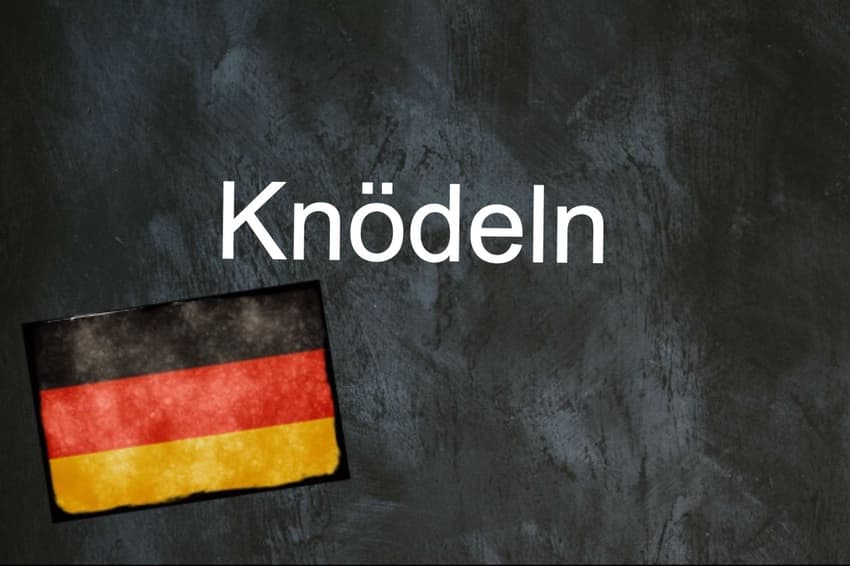German word of the day: Knödeln

Today’s weirdly specific German word combines traditional cuisine with bad singing
A person who “knödels” is someone who sings or speaks in a throaty or guttural way.
You might have heard about Knödel.
It’s a word with no direct translation which refers to the snowball shaped dumplings eaten in Germany, Austria and the Czech Republic.
These can be made from potato flour, stale bread, or semolina. They can be plain, or they can be mixed with meat, mushrooms or spinach. They can be savoury, or they can be sweet and filled with apricot jam.
READ ALSO: The 10 heartiest German dishes to get you through winter
They are as versatile as they are filling.
But what in the world have they got to do with singing?

Knödel in mushroom sauce. Photo: DPA
It’s tempting to think of the word as a parallel to the English “having a frog in one’s throat” which is a response you’ll often hear if you’re trying to speak with a sore or hoarse throat.
In fairness, it’s quite possible that having a Knödel stuck in your throat would result in some suitably guttural noises. However, language specialists seem to trace its usage back to the shared root of both words.
Etymologists have gotten their knickers in a twist over the claim that “Knödel” originates from the Latin word for knot, “nodus”. In truth, it comes from the much older Proto-Indo-European word for knot, “gnod”.
Just to make this clear, this means the word is really, really old. Proto-Indo-European language was around from about 4500 BC – you do the maths. Over time and adaptation by Germanic tribes through to modern German, “gnod” became “Knoten”.
Somewhere along the way, someone very hungry eyed up some old bread buns – still known as “Knoten” in some parts of Germany – and so the Knödel was born.
Maybe the word “knödeln” refers to the idea of someone having a knot in their throat. Maybe it refers to the actual process of making Knödel, wherein stale bread is, somewhat nauseatingly mixed with spices and milk.
Either way, it’s clear that the sound is meant to be, at best, unpleasant.
Examples:
Der Tenor knödelte nur so darum.
The tenor was well and truly croaking.
Was knödelst du?
What are you croaking around for?
Comments (2)
See Also
A person who “knödels” is someone who sings or speaks in a throaty or guttural way.
You might have heard about Knödel.
It’s a word with no direct translation which refers to the snowball shaped dumplings eaten in Germany, Austria and the Czech Republic.
These can be made from potato flour, stale bread, or semolina. They can be plain, or they can be mixed with meat, mushrooms or spinach. They can be savoury, or they can be sweet and filled with apricot jam.
READ ALSO: The 10 heartiest German dishes to get you through winter
They are as versatile as they are filling.
But what in the world have they got to do with singing?

Knödel in mushroom sauce. Photo: DPA
It’s tempting to think of the word as a parallel to the English “having a frog in one’s throat” which is a response you’ll often hear if you’re trying to speak with a sore or hoarse throat.
In fairness, it’s quite possible that having a Knödel stuck in your throat would result in some suitably guttural noises. However, language specialists seem to trace its usage back to the shared root of both words.
Etymologists have gotten their knickers in a twist over the claim that “Knödel” originates from the Latin word for knot, “nodus”. In truth, it comes from the much older Proto-Indo-European word for knot, “gnod”.
Just to make this clear, this means the word is really, really old. Proto-Indo-European language was around from about 4500 BC – you do the maths. Over time and adaptation by Germanic tribes through to modern German, “gnod” became “Knoten”.
Somewhere along the way, someone very hungry eyed up some old bread buns – still known as “Knoten” in some parts of Germany – and so the Knödel was born.
Maybe the word “knödeln” refers to the idea of someone having a knot in their throat. Maybe it refers to the actual process of making Knödel, wherein stale bread is, somewhat nauseatingly mixed with spices and milk.
Either way, it’s clear that the sound is meant to be, at best, unpleasant.
Examples:
Der Tenor knödelte nur so darum.
The tenor was well and truly croaking.
Was knödelst du?
What are you croaking around for?
Join the conversation in our comments section below. Share your own views and experience and if you have a question or suggestion for our journalists then email us at [email protected].
Please keep comments civil, constructive and on topic – and make sure to read our terms of use before getting involved.
Please log in here to leave a comment.